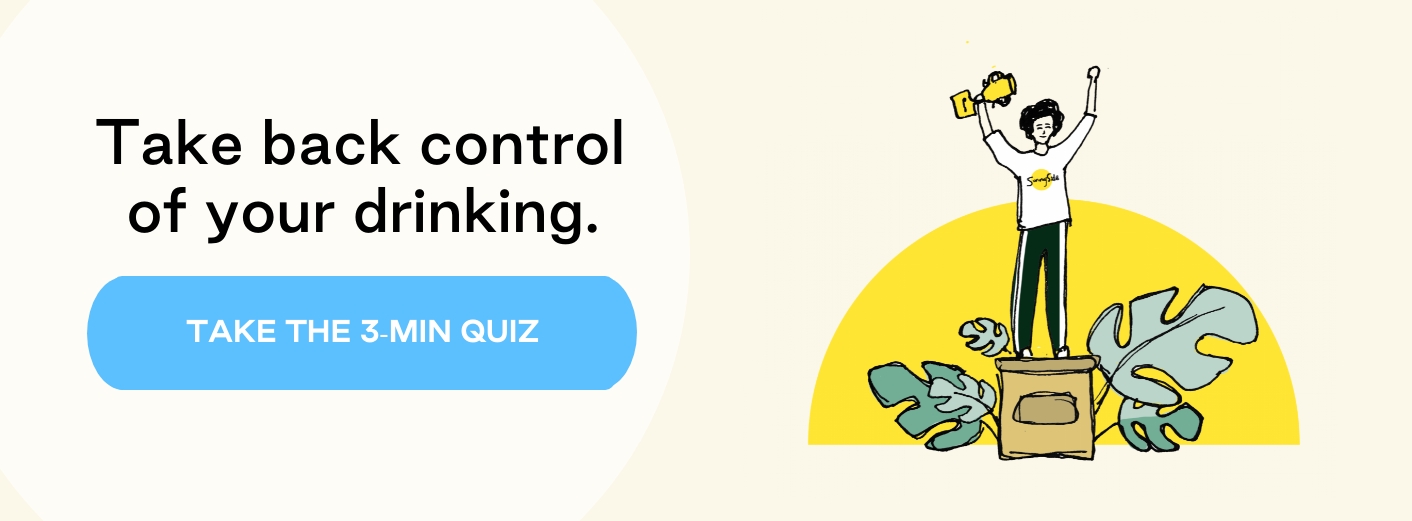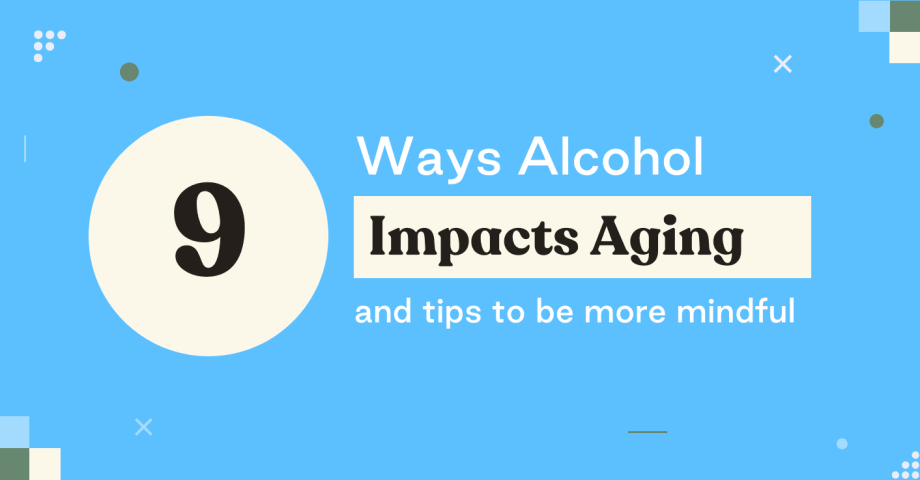Last Updated on May 15, 2023
We usually think about how alcohol will affect us when we wake up the next morning. Sometimes it’s puffy skin, dark under eye circles, or more often than not, a headache. But what about the long term effects that creep up more slowly, like brown spots after too many summers in the sun?
The signs of premature aging pop up whenever we put our bodies in unhealthy situations for too long, and that includes drinking more than our bodies can handle.
Why does alcohol cause quicker aging in women than men?
First, women are usually smaller in size, which means the concentration of alcohol in the blood is automatically higher – but that’s not all. Even if a woman has the exact same weight as a man, her blood alcohol levels will be higher.
Female bodies have less water and more fat compared to men. Since water dilutes alcohol and fat retains it, women’s organs will have higher concentrations of alcohol for longer periods of time. Finally, women also have lower levels of the enzyme that breaks down alcohol, dehydrogenase.
Women are recommended to have just one drink a day or less, as it’s the biological equivalent to two drinks for men. It’s also part of the reason why women are more at-risk of developing alcohol-related organ damage, trauma, and interpersonal difficulties. While women may become dependent on alcohol later in life compared to men, they also seem to develop addictions and suffer its consequences more quickly.

9 Ways Alcohol Can Speed Up Aging
The extra work and inflammation caused by too much alcohol makes everyone age prematurely, whether it’s immediately noticeable or not. Since women are more affected by alcohol than men, their speed of aging is unfortunately even quicker. You may only notice a hangover the day after drinking, but there’s a lot more going on behind the scenes. So here are some health points to help you consider drinking more mindfully to avoid the aging effects of too much alcohol.
1) Stress and hormonal changes
Chronic alcohol use directly affects the endocrine (hormonal) and nervous system. Women are much more sensitive to hormone shifts than men, making alcohol particularly risky. Hormonal imbalances happen whenever there’s a mess up in communication between the systems and it causes both behavioral and physiological issues. That can mean thyroid problems and psychological disorders that put extra stress on the body and mind, increasing the risk of premature aging and certain cancers.
Another one of alcohol’s negative hormonal effects is on the reproductive system. It disrupts normal menstrual cycles, fertility, sex drive, and creates added hormonal issues in postmenopausal women. These hormonal changes also alter the way women’s bones age and can lead to early osteoporosis.
2) Sleep disruptions
Your body’s cells repair and regenerate while you sleep. If you don’t get a good night’s rest, your body can’t do all the work it needs to keep itself healthy and fight inflammation. Even a little bit of alcohol can disrupt your sleep, which means your body can’t heal properly and the aging effects from inflammation and hormonal imbalances from poor sleep quicken.
3) Skin and tissue inflammation
We all think of wrinkles when we think of aging, but there are other skin issues that alcohol causes, too. On top of wrinkles, there’s skin puffiness, dryness, red cheeks, and purple capillaries. If you have too much alcohol over a long period of time, blood vessels continue to dilate and grow. That means you can end up with an uneven skin tone, permanent redness, broken or bursting capillaries, and blotches similar to rosacea. Naturally, we associate our face’s skin health to aging, so drinking midfully can go a long way to keeping your skin looking young and healthy.
4) Dehydration and organ damage
Most people don’t drink enough water, but adding alcohol only creates more dehydration. It causes more urination and that leaves your cells without the water needed to work smoothly. That leads to oxidative stress, which causes many health issues, like increased risks of diseases and infections. It also damages organs like the skin, reducing collagen and elasticity leading to wrinkles and other external signs of aging.
5) Liver strain
Alcohol puts a strain on the liver as it’s the main organ that metabolizes alcohol and detoxifies your body from its negative effects. It’s also one of the body’s most essential organs with over 500 functions, like supporting your immune system, storing nutrition, and removing bacteria and waste. Mindful drinking supports your liver by helping it metabolize alcohol more efficiently, with less stress. This helps you avoid illnesses and keeps you feeling and looking vibrant, young, and healthy.

6) Weakened immune system and poor gut health
Healthy gut bacteria are negatively affected by alcohol, and over 70% of the body’s immune cells are made in the gut. Your bacteria also control your mood, skin conditions, weight, blood sugar, food intolerances, autoimmune disorders, ability to fight infections and disease, bacterial overgrowth, damaged stomach lining and inflammation, energy levels, and more. Without a balanced gut microbiome, you open yourself up to getting sick more often and a wide variety of issues that add stress and cause early aging. Luckily, you can create a healthy gut with mindful drinking and eating, and you’ll build a powerful immune system with healthy organs that keep you energized and strong.
7) Risks of chronic conditions
With the added strain put on the organs to manage the effects of too much alcohol, the body’s immune system and ability to manage inflammation weakens over time. The more inflammation you have, the more likely you are to develop chronic conditions like ulcers, diabetes, and high blood pressure. Any chronic condition you have puts an added stress on your body and contributes to premature aging.
8) Brain health, anxiety, and depression
Alcohol disrupts normal communication and chemical function in the brain. Not only does it create more chances of injury while drinking, but it exacerbates anxiety and depression. Neurotransmitters like serotonin and dopamine are altered by alcohol, worsening symptoms of mood disorders in the long run. The stress caused by these disorders causes inflammation and premature aging.
9) Bad decision making
Overindulging in alcohol leads to impaired decision making, like making it harder to want to choose healthy food after a few drinks. It also lowers productivity and affects your ability to function the next day. Plus, if you have nausea, a headache, or feel groggy because of a bad night’s sleep and a hangover, it will be even more difficult to want to workout or make healthy eating decisions the next day.

How mindful drinking can help prevent aging from alcohol use
Luckily, there are many things you can do to help prevent and reduce aging. A mindful lifestyle will help you learn how to be present, listen to your body, and avoid added stress and illnesses that promote aging. Here are some tips to get started:
1) Drink mindfully
Learn how to prioritize your health while enjoying your favorite drink. Become more aware of your relationship to drinking and how it affects you. Keep in mind, women do best with one drink per day.
2) Go for clear liquids
Try to avoid sugary drinks or those with additives and salt that make it more difficult to digest and cause weight gain and inflammation.
3) Prioritize sleep
The better your sleep, the better chance your body has of fighting inflammation and regenerating its cells to keep you feeling strong and healthy. Remember, alcohol at night disrupts sleep so aim to avoid alcohol a few hours before bed.
4) Add whole foods
Whole foods are foods that are processed minimally or not at all. They contain a lot of healthy nutrients to help your body recover after a night of drinking. Some of these foods and nutrients include:
- Add antiinflammatory foods as part of your regular diet. These will be natural, whole foods such as nuts, seeds, vegetables, fruit, and lean proteins like legumes and beans.
- Consider supplements such as multivitamins, turmeric, omega-3s, probiotics, and collagen to boost your immune system and restore gut health.
- Antioxidants in the form of colorful foods will go a long way to restore your body’s vitality by fighting inflammation (berries, green leafy veggies, dark chocolate).
- Eat the rainbow to ensure your body gets a variety of vitamins and minerals to strengthen your tissues and immune function (Vitamin A from carrots and sweet potatoes, Vitamin C from fruit, peppers, broccoli, and Omega 3s from fatty fish, hemp, nuts and seeds).
- Avoid sugar, fried foods, and cured meats as they are full of inflammatory additives, cause weight gain, chronic illnesses, and dehydration.
5) Reduce stress
It’s not easy to feel calm in our busy and stressful lives, but even 120 minutes in nature a week reduces levels of anxiety, depression, weight, and risks of illnesses and cancer. That could be 30 minutes of walking in parks four days a week (like on a lunch break or after dinner), or a long walk, picnic, or hike on the weekend. Luckily, as with the recommended 150 minutes of exercise a week, the benefits come from the total minutes, so don’t stress if you miss a day.
Next time you’re feeling stressed and find yourself reaching for a drink, think about taking a relaxing walk outdoors (which also helps to remove yourself from temptation). If it’s miserable weather outside, even a 10 minute yoga or meditation video has been shown to lower cortisol.

Start by tracking your alcohol consumption to be more mindful
Sticking to one drink a day or less can be challenging, that’s why Sunnyside helps with challenges, tips, and a no pressure approach to mindful drinking. Learning to pace yourself, finding your why, and creating a plan takes support. The sunnyside app can help you create your own personal weekly challenges that fit your lifestyle with accountability. Try your free 15 day trial and see how it works for you.



